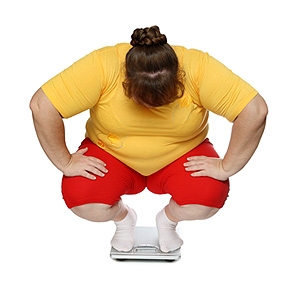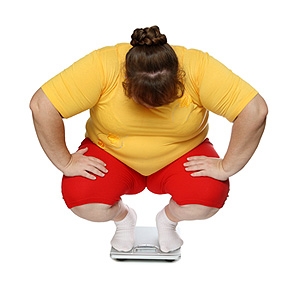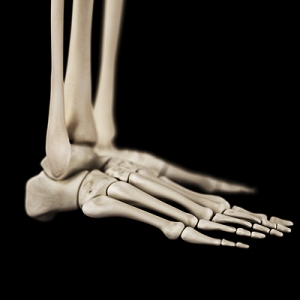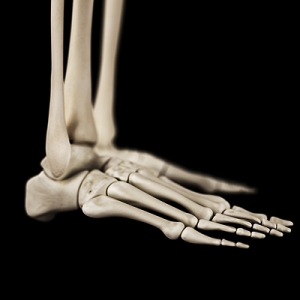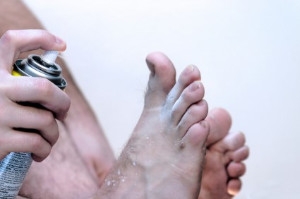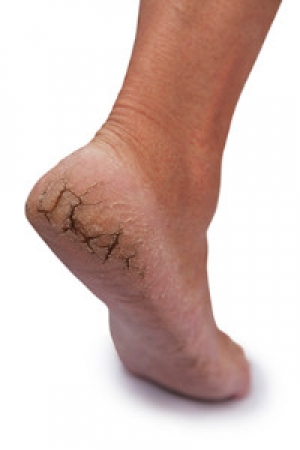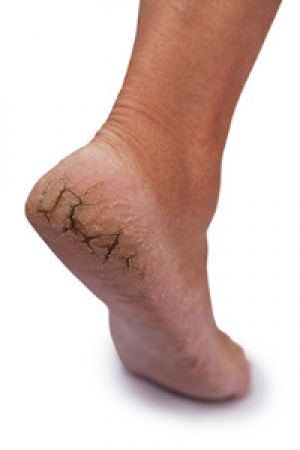Items filtered by date: April 2018
Can Being Obese Hurt My Feet?
The feet are considered to be the foundation of the body, and when the body endures pressure from being overweight, the feet bear the brunt of these abnormal stresses. Certain conditions may develop in the feet of an obese person, such as fallen arches and chronic heel pain. If children become obese, their ability to participate in sporting activities may be greatly diminished, potentially due to any pain the feet and arches may encounter. Custom-made insoles may be suggested for an overweight child to wear, and this may provide the support needed to aid in the formation of the arch. Individuals who have this condition may suffer from frequent falls, which is often as a result of a compromised gait. The feet will generally become larger and will benefit from being measured for correct sizing to avoid corns and calluses from developing. If you suffer from foot pain due to obesity, please consider a consultation with a podiatrist for dietary and lifestyle changes.
The more you weigh, the harder your feet must work to support your body. If you’re an obese individual and are concerned about your feet, contact Dr. Kenneth Donovan from Advanced Care Foot and Ankle. Our doctor can provide the care you need to keep you pain-free and on your feet.
Obesity and Your Feet
People who are overweight are putting more pressure on their ankles, knees, and hips as well as their feet. This unfortunately can lead to variety of different issues.
Problems & Complications Stemming from Obesity
- When the body is overweight, it tries to compensate by changing the way that it moves. An obese person may lean forward and put extra weight on the wrong part of the foot. This puts unnecessary stress on the feet.
- Obese people are also more likely to develop type II diabetes which is a condition that causes a lot of foot problems. People with diabetes often don’t feel the cuts and sores that they may have on their feet, which can lead to more complicated and severe issues.
- Plantar fasciitis is another foot condition that can be caused by obesity. Plantar fasciitis is an inflammation of the tissue along the bottom of the foot, which causes pain and stiffness while walking and climbing stairs.
If you have any questions, please feel free to contact one of our offices located in Warren, Livingston, and Toms River, NJ. We offer the newest diagnostic and treatment technologies for all your foot care needs.
Can Being Obese Hurt My Feet?
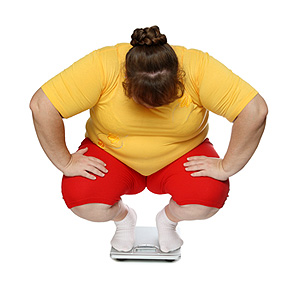 The feet are considered to be the foundation of the body, and when the body endures pressure from being overweight, the feet bear the brunt of these abnormal stresses. Certain conditions may develop in the feet of an obese person, such as fallen arches and chronic heel pain. If children become obese, their ability to participate in sporting activities may be greatly diminished, potentially due to any pain the feet and arches may encounter. Custom-made insoles may be suggested for an overweight child to wear, and this may provide the support needed to aid in the formation of the arch. Individuals who have this condition may suffer from frequent falls, which is often as a result of a compromised gait. The feet will generally become larger and will benefit from being measured for correct sizing to avoid corns and calluses from developing. If you suffer from foot pain due to obesity, please consider a consultation with a podiatrist for dietary and lifestyle changes.
The feet are considered to be the foundation of the body, and when the body endures pressure from being overweight, the feet bear the brunt of these abnormal stresses. Certain conditions may develop in the feet of an obese person, such as fallen arches and chronic heel pain. If children become obese, their ability to participate in sporting activities may be greatly diminished, potentially due to any pain the feet and arches may encounter. Custom-made insoles may be suggested for an overweight child to wear, and this may provide the support needed to aid in the formation of the arch. Individuals who have this condition may suffer from frequent falls, which is often as a result of a compromised gait. The feet will generally become larger and will benefit from being measured for correct sizing to avoid corns and calluses from developing. If you suffer from foot pain due to obesity, please consider a consultation with a podiatrist for dietary and lifestyle changes.
The more you weigh, the harder your feet must work to support your body. If you’re an obese individual and are concerned about your feet, contact Dr. Kenneth Donovan from Advanced Care Foot and Ankle. Our doctor can provide the care you need to keep you pain-free and on your feet.
Obesity and Your Feet
People who are overweight are putting more pressure on their ankles, knees, and hips as well as their feet. This unfortunately can lead to variety of different issues.
Problems & Complications Stemming from Obesity
- When the body is overweight, it tries to compensate by changing the way that it moves. An obese person may lean forward and put extra weight on the wrong part of the foot. This puts unnecessary stress on the feet.
- Obese people are also more likely to develop type II diabetes which is a condition that causes a lot of foot problems. People with diabetes often don’t feel the cuts and sores that they may have on their feet, which can lead to more complicated and severe issues.
- Plantar fasciitis is another foot condition that can be caused by obesity. Plantar fasciitis is an inflammation of the tissue along the bottom of the foot, which causes pain and stiffness while walking and climbing stairs.
If you have any questions, please feel free to contact one of our offices located in Warren, Livingston, and Toms River, NJ . We offer the newest diagnostic and treatment technologies for all your foot care needs.
Symptoms of Arthritic Feet
The tendons, ligaments, and 26 bones that the foot is comprised of are responsible for standing, walking, and absorbing the weight of the body.
Painful conditions involving the feet may occur as a result of improper foot care, working on your feet, or sporting activities. If you experience pain in the feet, in addition to any swelling or tightness, you may have what is referred to as arthritis. You may notice tingling in the feet, which may indicate a circulatory condition, and the joints may begin to look deformed. It’s important to maintain proper foot care, and this may be accomplished by washing and drying the feet completely and following by applying a moisturizer. The flexibility and movement of the feet may be significantly improved by incorporating exercise into your daily routine. Please consider scheduling a consultation with a podiatrist for additional information on how to take care of arthritic feet.
Arthritis can be a difficult condition to live with. If you are seeking treatment, contact Dr. Kenneth Donovan from Advanced Care Foot and Ankle. Our doctor can provide the care you need to keep you pain-free and on your feet.
Arthritic Foot Care
Arthritis is a term that is commonly used to describe joint pain.
The condition itself can occur to anyone of any age, race, or gender, and there are over 100 types of it.
Nevertheless, arthritis is more commonly found in women compared to men, and it is also more prevalent in those who are overweight. The causes of arthritis vary depending on which type of arthritis you have. Osteoarthritis for example, is often caused by injury, while rheumatoid arthritis is caused by a misdirected immune system.
Symptoms
- Swelling
- Pain
- Stiffness
- Decreased Range of Motion
Arthritic symptoms range in severity, and they may come and go. Some symptoms stay the same for several years but could potentially get worse with time. Severe cases of arthritis can prevent its sufferers from performing daily activities and make walking difficult.
Risk Factors
- Occupation – Occupations requiring repetitive knee movements have been linked to osteoarthritis
- Obesity – Excess weight can contribute to osteoarthritis development
- Infection – Microbial agents can infect the joints and trigger arthritis
- Joint Injuries – Damage to joints may lead to osteoarthritis
- Age – Risk increases with age
- Gender –Most types are more common in women
- Genetics – Arthritis can be hereditary
If you suspect your arthritis is affecting your feet, it is crucial that you see a podiatrist immediately. Your doctor will be able to address your specific case and help you decide which treatment method is best for you.
If you have any questions, please feel free to contact one of our offices located in Warren, Livingston, and Toms River, NJ. We offer the newest diagnostic and treatment technologies for all your foot care needs.
Symptoms of Arthritic Feet
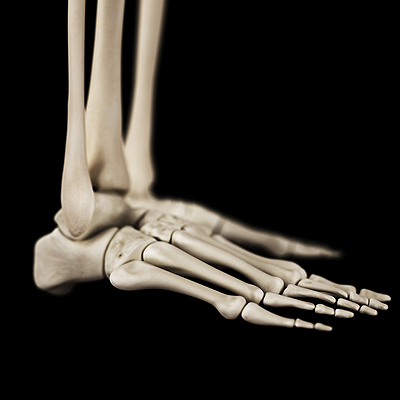 The tendons, ligaments, and 26 bones that the foot is comprised of are responsible for standing, walking, and absorbing the weight of the body. Painful conditions involving the feet may occur as a result of improper foot care, working on your feet, or sporting activities. If you experience pain in the feet, in addition to any swelling or tightness, you may have what is referred to as arthritis. You may notice tingling in the feet, which may indicate a circulatory condition, and the joints may begin to look deformed. It’s important to maintain proper foot care, and this may be accomplished by washing and drying the feet completely and following by applying a moisturizer. The flexibility and movement of the feet may be significantly improved by incorporating exercise into your daily routine. Please consider scheduling a consultation with a podiatrist for additional information on how to take care of arthritic feet.
The tendons, ligaments, and 26 bones that the foot is comprised of are responsible for standing, walking, and absorbing the weight of the body. Painful conditions involving the feet may occur as a result of improper foot care, working on your feet, or sporting activities. If you experience pain in the feet, in addition to any swelling or tightness, you may have what is referred to as arthritis. You may notice tingling in the feet, which may indicate a circulatory condition, and the joints may begin to look deformed. It’s important to maintain proper foot care, and this may be accomplished by washing and drying the feet completely and following by applying a moisturizer. The flexibility and movement of the feet may be significantly improved by incorporating exercise into your daily routine. Please consider scheduling a consultation with a podiatrist for additional information on how to take care of arthritic feet.
Arthritis can be a difficult condition to live with. If you are seeking treatment, contact Dr. Kenneth Donovan from Advanced Care Foot and Ankle. Our doctor can provide the care you need to keep you pain-free and on your feet.
Arthritic Foot Care
Arthritis is a term that is commonly used to describe joint pain. The condition itself can occur to anyone of any age, race, or gender, and there are over 100 types of it. Nevertheless, arthritis is more commonly found in women compared to men, and it is also more prevalent in those who are overweight. The causes of arthritis vary depending on which type of arthritis you have. Osteoarthritis for example, is often caused by injury, while rheumatoid arthritis is caused by a misdirected immune system.
Symptoms
- Swelling
- Pain
- Stiffness
- Decreased Range of Motion
Arthritic symptoms range in severity, and they may come and go. Some symptoms stay the same for several years but could potentially get worse with time. Severe cases of arthritis can prevent its sufferers from performing daily activities and make walking difficult.
Risk Factors
- Occupation – Occupations requiring repetitive knee movements have been linked to osteoarthritis
- Obesity – Excess weight can contribute to osteoarthritis development
- Infection – Microbial agents can infect the joints and trigger arthritis
- Joint Injuries – Damage to joints may lead to osteoarthritis
- Age – Risk increases with age
- Gender –Most types are more common in women
- Genetics – Arthritis can be hereditary
If you suspect your arthritis is affecting your feet, it is crucial that you see a podiatrist immediately. Your doctor will be able to address your specific case and help you decide which treatment method is best for you.
If you have any questions, please feel free to contact one of our offices located in Warren, Livingston, and Toms River, NJ . We offer the newest diagnostic and treatment technologies for all your foot care needs.
What causes Athlete’s Foot?
If you experience a fungus that affects your feet, you may have what is referred to as athlete’s foot. Common symptoms of this condition may include itching, blistering, or cracked skin. If you develop athlete’s foot, it’s advised to seek treatment as soon as possible so infection can be prevented. The fungus typically thrives in moist environments, and may live on shower room floors or in public pools. Athlete’s foot can easily spread, and it’s recommended that shower shoes are worn to possibly prevent this fungus from entering the skin. Additional preventive measures may include washing the feet and drying thoroughly between the toes, using a powder to absorb excessive moisture, and avoiding wearing shoes that fit incorrectly. If you have athlete’s foot, please consult with a podiatrist for additional information about prevention and treatment options.
Athlete’s foot is an inconvenient condition that can be easily reduced with the proper treatment. If you have any concerns about your feet and ankles, contact Dr. Kenneth Donovan from Advanced Care Foot and Ankle.
Our doctor will treat your foot and ankle needs.
Athlete’s Foot: The Sole Story
Athlete's foot, also known as tinea pedis, can be an extremely contagious foot infection. It is commonly contracted in public changing areas and bathrooms, dormitory style living quarters, around locker rooms and public swimming pools, or anywhere your feet often come into contact with other people.
Solutions to Combat Athlete’s Foot
- Hydrate your feet by using lotion
- Exfoliate
- Buff off nails
- Use of anti-fungal products
- Examine your feet and visit your doctor if any suspicious blisters or cuts develop
Athlete’s foot can cause many irritating symptoms such as dry and flaking skin, itching, and redness. Some more severe symptoms can include bleeding and cracked skin, intense itching and burning, and even pain when walking. In the worst cases, Athlete’s foot can cause blistering as well. Speak to your podiatrist for a better understanding of the different causes of Athlete’s foot, as well as help in determining which treatment options are best for you.
If you have any questions please feel free to contact one of our offices located in Warren, Livingston, and Toms River, NJ. We offer the newest diagnostic and treatment technologies for all your foot and ankle needs.
What causes Athlete’s Foot?
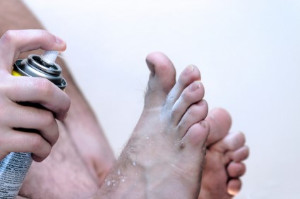 If you experience a fungus that affects your feet, you may have what is referred to as athlete’s foot. Common symptoms of this condition may include itching, blistering, or cracked skin. If you develop athlete’s foot, it’s advised to seek treatment as soon as possible so infection can be prevented. The fungus typically thrives in moist environments, and may live on shower room floors or in public pools. Athlete’s foot can easily spread, and it’s recommended that shower shoes are worn to possibly prevent this fungus from entering the skin. Additional preventive measures may include washing the feet and drying thoroughly between the toes, using a powder to absorb excessive moisture, and avoiding wearing shoes that fit incorrectly. If you have athlete’s foot, please consult with a podiatrist for additional information about prevention and treatment options.
If you experience a fungus that affects your feet, you may have what is referred to as athlete’s foot. Common symptoms of this condition may include itching, blistering, or cracked skin. If you develop athlete’s foot, it’s advised to seek treatment as soon as possible so infection can be prevented. The fungus typically thrives in moist environments, and may live on shower room floors or in public pools. Athlete’s foot can easily spread, and it’s recommended that shower shoes are worn to possibly prevent this fungus from entering the skin. Additional preventive measures may include washing the feet and drying thoroughly between the toes, using a powder to absorb excessive moisture, and avoiding wearing shoes that fit incorrectly. If you have athlete’s foot, please consult with a podiatrist for additional information about prevention and treatment options.
Athlete’s foot is an inconvenient condition that can be easily reduced with the proper treatment. If you have any concerns about your feet and ankles, contact Dr. Kenneth Donovan from Advanced Care Foot and Ankle. Our doctor will treat your foot and ankle needs.
Athlete’s Foot: The Sole Story
Athlete's foot, also known as tinea pedis, can be an extremely contagious foot infection. It is commonly contracted in public changing areas and bathrooms, dormitory style living quarters, around locker rooms and public swimming pools, or anywhere your feet often come into contact with other people.
Solutions to Combat Athlete’s Foot
- Hydrate your feet by using lotion
- Exfoliate
- Buff off nails
- Use of anti-fungal products
- Examine your feet and visit your doctor if any suspicious blisters or cuts develop
Athlete’s foot can cause many irritating symptoms such as dry and flaking skin, itching, and redness. Some more severe symptoms can include bleeding and cracked skin, intense itching and burning, and even pain when walking. In the worst cases, Athlete’s foot can cause blistering as well. Speak to your podiatrist for a better understanding of the different causes of Athlete’s foot, as well as help in determining which treatment options are best for you.
If you have any questions please feel free to contact one of our offices located in Warren, Livingston, and Toms River, NJ . We offer the newest diagnostic and treatment technologies for all your foot and ankle needs.
Causes of Cracked Heels
Cracked heels is a foot condition that typically develops from pressure endured by the feet from standing for long periods of time. Additional causes can include wearing shoes that fail to support the foot correctly or being overweight, possibly causing the skin on the heels to crack under the additional pressure. There may also be medical conditions that can contribute to developing this condition including athlete’s foot, psoriasis, or eczema. Lack of consuming proper amounts of water can lead to having cracked heels, so it’s wise to hydrate frequently to prevent the skin from becoming excessively dry. There are several ways to prevent this ailment from occurring, which may include dietary changes, choosing shoes that properly support the heel of the foot, and utilizing a moisturizer that will help the skin to soften. A consultation with a podiatrist is suggested for additional information on how to treat cracked heels.
Cracked heels are unsightly and can cause further damage to your shoes and feet. If you have any concerns, contact Dr. Kenneth Donovan from Advanced Care Foot and Ankle. Our doctor can provide the care you need to keep you pain-free and on your feet.
Cracked Heels
Cracked heels appear unappealing and can make it harder for you walk around in sandals. Aside from looking unpleasant, cracked heels can also tear stockings, socks, and wear out your shoes. There are several methods to help restore a cracked heel and prevent further damage.
How Do You Get Them?
Dry skin is the number one culprit in creating cracked heels. Many athletes, walkers, joggers, and even swimmers suffer from cracked heels. Age and skin oil production play a role to getting cracked heels as well.
Promote Healing
Over the counter medicines can help, especially for those that need instant relief or who suffer from chronic dry feet.
Wear Socks – Wearing socks with medicated creams helps lock in moisture.
Moisturizers – Applying both day and night will help alleviate dryness which causes cracking.
Pumice Stones – These exfoliate and remove dead skin, which allows for smoother moisturizer application and better absorption into the skin.
Eating healthy with a well-balanced diet will give the skin a fresh and radiant look. Your body responds to the kinds of food you ingest. Omega-3 fatty acids and zinc supplements can also revitalize skin tissue.
Most importantly, seek professional help if unsure how to proceed in treating cracked heels.
A podiatrist will help you with any questions or information needed.
If you have any questions, please feel free to contact one of our offices located in Warren, Livingston, and Toms River, NJ. We offer the newest diagnostic and treatment technologies for all your foot care needs.
Causes of Cracked Heels
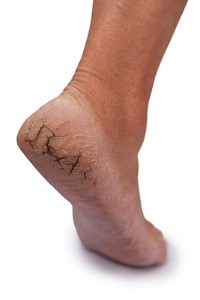 Cracked heels is a foot condition that typically develops from pressure endured by the feet from standing for long periods of time. Additional causes can include wearing shoes that fail to support the foot correctly or being overweight, possibly causing the skin on the heels to crack under the additional pressure. There may also be medical conditions that can contribute to developing this condition including athlete’s foot, psoriasis, or eczema. Lack of consuming proper amounts of water can lead to having cracked heels, so it’s wise to hydrate frequently to prevent the skin from becoming excessively dry. There are several ways to prevent this ailment from occurring, which may include dietary changes, choosing shoes that properly support the heel of the foot, and utilizing a moisturizer that will help the skin to soften. A consultation with a podiatrist is suggested for additional information on how to treat cracked heels.
Cracked heels is a foot condition that typically develops from pressure endured by the feet from standing for long periods of time. Additional causes can include wearing shoes that fail to support the foot correctly or being overweight, possibly causing the skin on the heels to crack under the additional pressure. There may also be medical conditions that can contribute to developing this condition including athlete’s foot, psoriasis, or eczema. Lack of consuming proper amounts of water can lead to having cracked heels, so it’s wise to hydrate frequently to prevent the skin from becoming excessively dry. There are several ways to prevent this ailment from occurring, which may include dietary changes, choosing shoes that properly support the heel of the foot, and utilizing a moisturizer that will help the skin to soften. A consultation with a podiatrist is suggested for additional information on how to treat cracked heels.
Cracked heels are unsightly and can cause further damage to your shoes and feet. If you have any concerns, contact Dr. Kenneth Donovan from Advanced Care Foot and Ankle. Our doctor can provide the care you need to keep you pain-free and on your feet.
Cracked Heels
Cracked heels appear unappealing and can make it harder for you walk around in sandals. Aside from looking unpleasant, cracked heels can also tear stockings, socks, and wear out your shoes. There are several methods to help restore a cracked heel and prevent further damage.
How Do You Get Them?
Dry skin is the number one culprit in creating cracked heels. Many athletes, walkers, joggers, and even swimmers suffer from cracked heels. Age and skin oil production play a role to getting cracked heels as well.
Promote Healing
Over the counter medicines can help, especially for those that need instant relief or who suffer from chronic dry feet.
Wear Socks – Wearing socks with medicated creams helps lock in moisture.
Moisturizers – Applying both day and night will help alleviate dryness which causes cracking.
Pumice Stones – These exfoliate and remove dead skin, which allows for smoother moisturizer application and better absorption into the skin.
Change in Diet
Eating healthy with a well-balanced diet will give the skin a fresh and radiant look. Your body responds to the kinds of food you ingest. Omega-3 fatty acids and zinc supplements can also revitalize skin tissue.
Most importantly, seek professional help if unsure how to proceed in treating cracked heels. A podiatrist will help you with any questions or information needed.
If you have any questions, please feel free to contact one of our offices located in Warren, Livingston, and Toms River, NJ . We offer the newest diagnostic and treatment technologies for all your foot care needs.
Read more about Solutions for Cracked Heels